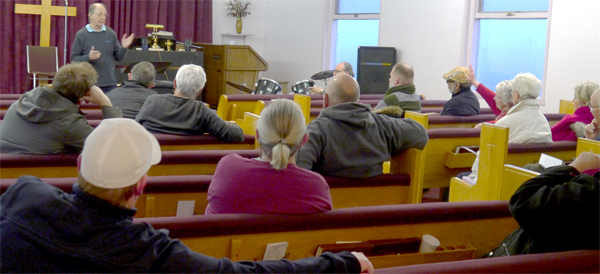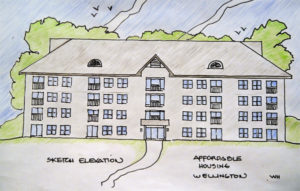Community brainstorms on what affordable housing in Wellington would look like
Administrator | Mar 28, 2018 | Comments 5

Meeting organizer Barry Davidson addresses citizens interested in affordable housing options in Wellington. the audience.
Story and photo by Sharon Harrison
Wellington residents concerned about the lack of affordable housing in Prince Edward County met Tuesday to share ideas, options and to brainstorm.
Led by Wellington resident and businessman Barry Davidson, the meeting at Wellington Pentecostal Church drew several dozen citizens interested in hearing options – including co-op housing, town houses, multi-units, apartment – and whether they should be for sale, or for rent.
“In my mind, it is a feasibility study to see whether it’s feasible to build housing here,” said Davidson, who is responsible for the Twelve Trees development in Wellington. “We are interested in seeing how to go about providing some affordable housing for people who live here in Wellington and in the area.”
Davidson said he likes the idea of investigating co-operative housing.
“The vision I have is whatever the housing is, it is for all ages – young people, young people who are just starting out, with families, little people growing up and seniors,” said Davidson.
Local businessman Michael Hymus agreed affordable housing in a co-op, or sponsorship program involving pride of ownership would be beneficial.
“When you have pride of ownership, it helps you want to maintain your property more and invest in your property and your community,” Hymus said. “I wonder if we can set up a sponsorship program where people who have a little bit more in the community can hold the sponsorship mortgage for someone that doesn’t have as much. They have the opportunity of not just living in co-op, but having the chance of ownership… What we need to do is allow these people to grown equity in their homes, to get pride of ownership.”
Ken How, leading the affordable seniors co-housing potential redevelopment of the former Pinecrest public school, agreed Hymus’ idea for ownership is needed. “Younger people have the capacity to better themselves whereas seniors don’t,” he said. “I see the need for younger families to have somewhere where they can live and actually stay and work in Wellington, rather than have to come in from all around to do jobs.”
Hymus also addressed the issue of not being able to find staff for his businesses because employees cannot find housing.

A sketch of a proposed affordable housing building was met with polar reaction. Some found it pleasing, but at least one suggested it was “flat and formidable. It could be a jail”.
“When you do manage to find staff, you can’t get them to come here because there is no housing. You can’t get a skilled chef, ” said Hymus. “Staff are now coming in from Belleville and Trenton and it’s very frustrating. I want to open businesses. I want to create employment. I want to do these things, but how do I find the employment to do it? It’s a catch 22, it really is,” he said.
The need, added How, is for people who are living here year-round and would like to see precautions to prevent accommodations from becoming vacation rentals.
Members from the audience chimed in agreement, offering opinions on various types of housing, and offering that the need for rental housing may outweigh ownership.
“The single home sort of model is just not feasible because we need it now,” said an audience member. “The only model is to look at a town house or a unit and you can build it a lot quicker and you can make it more accessible for sharing a lot of costs, etc.”
“The main thing I think we need to have is renting a the best way to go because a lot of people who are looking at local housing don’t have the outlay to do that first payment and all that upkeep of a house,” commented another.
“There are different types of co-op,” said Davidson. “An equity co-op, as the name suggests, you are putting a larger amount of money in. I am not talking about that kind of co-op, I am talking about the type which I think is called a common co-op which is a nominal amount to move in.”
The types of accommodations talked about were multi-units, townhouses and walk-up units with two to three bedrooms, with most in the room agreeing that the units did not have to be large.
“When you are looking at costs, the single or detached or town house is much greater than an apartment building. If you are looking at making it affordable, you are pretty much restricted to an apartment-type building,” said an audience member.
Another added “It not only is it hard to find a place, but it is hard to find a place that is decent and affordable. I think the need for an apartment building that was affordable, but not necessarily all affordable, but a mix of things. Even if you have money in this community, finding a place to rent would be quite a challenge.”
Davidson agreed the vision should be a combination of affordable and market value housing.
Patrick Maloney shared his experiences having operated various types of co-ops in Toronto.
“One of the biggest issues is security of tenure. With renting, it is not knowing from year-to-year whether you can afford it. That security of tenure gives you that pride to do things in places you wouldn’t normally do as a renter,” he said.
“The co-op model is that everyone participates and you take care of the maintenance committee, the membership committee, all different kinds, it was managed by the people who were members,” said Maloney.
How also noted life-lease models, and included the example of the Legion Manor which he notes works well throughout the province.
Brief discussion followed on the need for support from all three levels of government.
“I am asking local government to waive the development charges, the connection fees and the building permits to start and maybe even reduce the taxes for the first 10 years or so,” said Davidson. “I don’t know how they will react, but I have to ask.”
The group agreed that the location be within walking and biking distance to Wellington due to lack of transit and should be fully accessible.
“When you are building houses, you are also building community,” said a member of the audience. “A mix means you have the energy of youth and you have the wisdom of aged and when you put them together, it keeps everyone alive and it keeps everybody involved.”
Filed Under: Featured Articles
About the Author:



































Well I think we are still allowed to purchase property and reside in it or rent. That’s just good business. Affordable housing is not the responsibility of an investor.
Today on Kijiji: “Family of 4. We both work full time. Active community members. 2 Kids in public school. The house we rent is being sold. Can provide great references. Would like to stay in Prince Edward county if we can.”
I’ll wager this house will be yet another Toronto-bought, spit-polished, AirBnB in the latest County hot-spot, Consecon.
I do not see vacation rentals being the demon. Very few of these would be an affordable option for thode seeking affordable housing.
Affordable housing is a problem “ county wide “ not just in hipster Wellington. Council needs to find a solution that works for all of PEC. Let’s start by dealing with the air bnb’s and vacation rentals that have dried up the affordable and available housing for local year round residents.
To little to late. My County my home…not anymore. I am being forced to rent an apartment in Trenton. One more family gone.